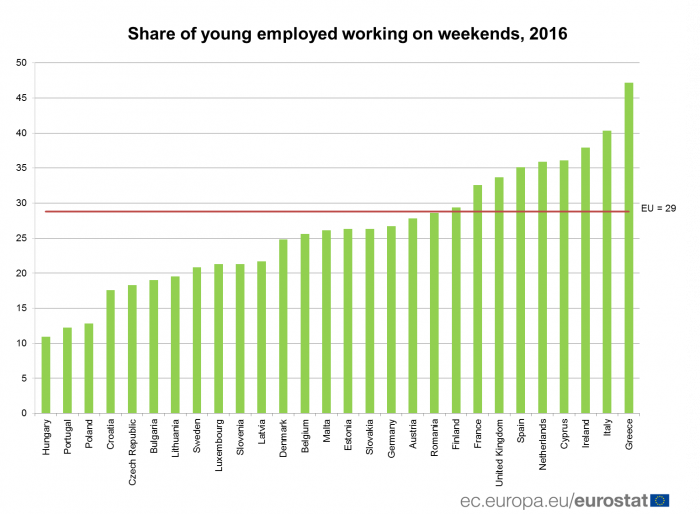Young Hungarians reluctant to work weekends

In the European Union, roughly three in ten young employees work on weekends. Young Hungarians are much less eager to do the same; indeed, Hungary recorded the lowest proportion of young people regularly working on weekends.
According to a survey conducted in 2016, 29% of employed persons in the EU aged 20 to 34 years (classified as the "young employed") usually work on weekends, says Eurostat, the EUʼs statistical office.
The lowest proportion of young employed people who work on weekends is among those with a tertiary education (20%). However, those with a tertiary education are also most likely to work long hours, defined as 49 hours or more per week (8%). At EU level, young employed people with a low level of education (lower secondary or below) are most likely to work on weekends (37%).
Almost half of young people employed in Greece (47%) reported working on weekends in 2016. More than a third of the young employed in Italy regularly worked on weekends (40%), closely followed by Ireland (38%), Cyprus and the Netherlands (both 36%), Spain (35%), and the United Kingdom (34%).
By contrast, Hungary recorded the lowest proportion of young employed working on weekends (11%), followed by Portugal (12%), Poland (13%), the Czech Republic and Croatia (both 18%).
SUPPORT THE BUDAPEST BUSINESS JOURNAL
Producing journalism that is worthy of the name is a costly business. For 27 years, the publishers, editors and reporters of the Budapest Business Journal have striven to bring you business news that works, information that you can trust, that is factual, accurate and presented without fear or favor.
Newspaper organizations across the globe have struggled to find a business model that allows them to continue to excel, without compromising their ability to perform. Most recently, some have experimented with the idea of involving their most important stakeholders, their readers.
We would like to offer that same opportunity to our readers. We would like to invite you to help us deliver the quality business journalism you require. Hit our Support the BBJ button and you can choose the how much and how often you send us your contributions.








